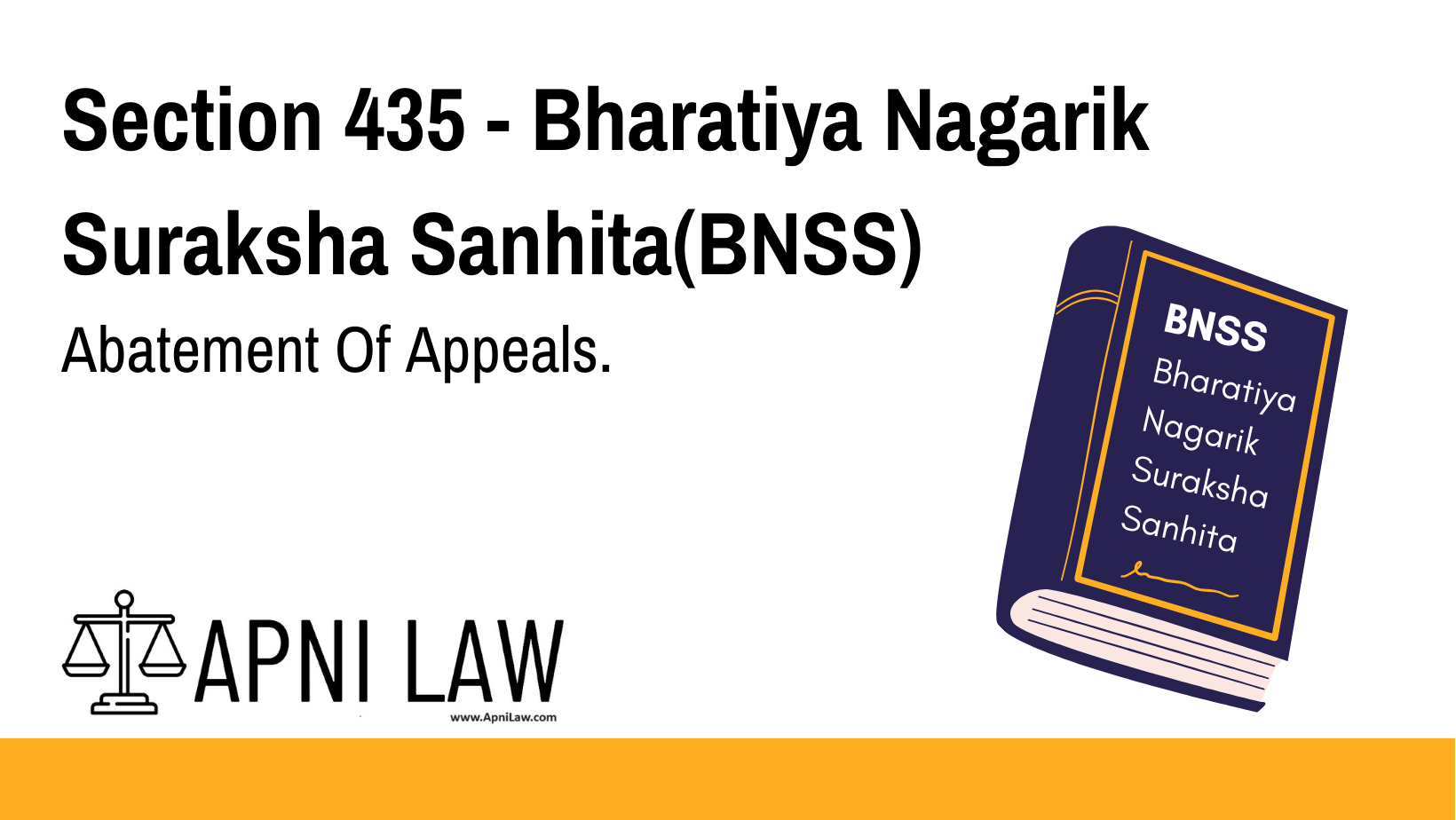Code: Section 435 BNSS
Section 435
(1) Every appeal under Section 418 or Section 419 shall finally abate on the death of the accused.
(2) Every other appeal under this Chapter (except an appeal from a sentence of fine) shall finally abate on the death of the appellant.
Provided that where the appeal is against a conviction and sentence of death or imprisonment, and the appellant dies during the pendency of the appeal, any of his near relatives may, within thirty days of the death of the appellant, apply to the Appellate Court for leave to continue the appeal. If leave is granted, the appeal shall not abate.
Explanation: In this section, “near relative” means a parent, spouse, lineal descendant, brother, or sister.
Explanation of Section 435 BNSS
Section 435 deals with the abatement (i.e., termination or cessation) of appeals upon the death of the appellant or accused. The section outlines the conditions under which an appeal will cease due to death, as well as provisions allowing certain relatives to continue the appeal under specific circumstances.
Key Provisions:
-
Abatement of Appeal Upon Death of the Accused:
- If the appeal is under Section 418 or Section 419, it will automatically abate (i.e., end) if the accused dies.
-
Abatement of Other Appeals:
- For all other appeals under this Chapter (except appeals for fines), the appeal will abate upon the death of the appellant.
-
Exception for Appeals Involving Conviction and Death/Imprisonment:
- If the appeal is related to a conviction involving death or imprisonment, and the appellant dies during the appeal process, the near relatives (defined below) may apply to the Appellate Court to continue the appeal.
- The application must be made within 30 days of the appellant’s death.
- If the Appellate Court grants leave, the appeal will not abate.
-
Definition of “Near Relative”:
- In this context, “near relative” includes:
- Parent
- Spouse
- Lineal descendant (children, grandchildren)
- Brother
- Sister
- In this context, “near relative” includes:
Illustration
Example 1: Death of the Accused in Appeal
A person appeals against their conviction under Section 418 (for enhancement of sentence). If the accused dies during the appeal, the appeal will automatically end (abate) under Section 435(1).
Example 2: Death of the Appellant in Other Appeals
In a case where the appellant is appealing a conviction, and the appellant dies during the appeal process (but it is not related to death sentence or imprisonment), the appeal will automatically abate unless the appeal concerns a fine.
Example 3: Continuing an Appeal After the Appellant’s Death
If the appeal is against a conviction and death sentence, and the appellant dies during the appeal, one of the near relatives (e.g., the spouse) may apply to the Appellate Court within 30 days for permission to continue the appeal. If the Court grants the application, the appeal will not abate.
Common Questions and Answers on Section 435 BNSS
1. What happens if the accused dies during an appeal under Section 418 or 419?
- Answer: The appeal will automatically abate (end) upon the death of the accused, as stated in Section 435(1).
2. Can an appeal still continue if the appellant dies during the process?
- Answer: If the appellant dies during the appeal (except when the appeal is about a fine), the appeal will abate. However, if the appeal involves a conviction and sentence of death or imprisonment, the near relatives can apply to the Appellate Court within 30 days to continue the appeal. If granted, the appeal will continue.
3. Who can continue the appeal if the appellant dies?
- Answer: The near relatives of the appellant, including parents, spouse, children, siblings, can apply to the Court to continue the appeal, provided they do so within 30 days of the appellant’s death.
4. Does this rule apply to appeals involving only fines?
- Answer: No, appeals from a sentence of fine do not abate upon the death of the appellant. The rule of abatement applies only to convictions or sentences that involve imprisonment or death.
Conclusion
Section 435 ensures that appeals may abate upon the death of the accused or appellant, with specific exceptions for cases involving death sentences or imprisonment. In such cases, near relatives can apply to the Appellate Court to continue the appeal, ensuring justice can still be pursued on behalf of the deceased appellant. The law outlines clear timelines and defines who qualifies as a “near relative” for this purpose.








